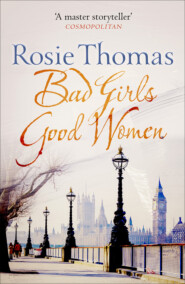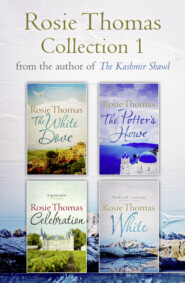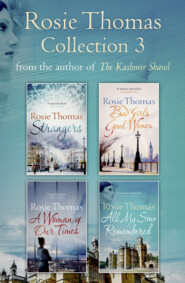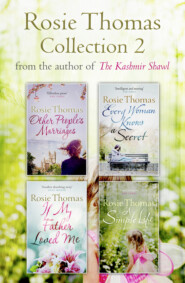По всем вопросам обращайтесь на: info@litportal.ru
(©) 2003-2025.
✖
Rosie Thomas 3-Book Collection: Moon Island, Sunrise, Follies
Автор
Год написания книги
2019
Настройки чтения
Размер шрифта
Высота строк
Поля
May rubbed her eyes and nose with the back of her hand. They stood looking at each other, not sure what to say next.
‘Are you in trouble?’
She shook her head, sniffing. ‘Sorry. I’m in your garden.’
‘Yes. I was going to chase you away with my big stick.’ He held up his knobbled walking stick. ‘But I can’t hardly do that if you’re crying, can I?’
May had been afraid of this old man when she had seen him at the Beams’. Now, closer up, he was a little less formidable. There were silvery fans of lines around his deep-set eyes and the hand resting on the knob of his stick shook uncontrollably. Even so, he did not look particularly benign.
‘Come inside.’
She would have made an excuse if it had been more of an invitation and less of an order. Instead she followed him into the frowning house.
The door opened into a little wood-panelled lobby hung with thick old curtains that smelt of dust. May imagined that the Fennymores would need all the draught insulation possible during the winters they spent alone up here on the bluff. Aaron held open a door for her, and she passed through into the middle of the house.
There was just one big room. Around three of the walls were floor-to-ceiling shelves made of thick, rough timber and the shelves were filled with dim-looking books. On the small spaces of wall that weren’t covered with books there were framed maps, and old brown-toned photographs behind glass, and little nests of smaller shelves made to display bits of what looked like carved bone. Against one wall there was a big wood-burning stove, with a chimney alcove stacked with cut logs. The seaward windows looked out at the bay and the island, but the curtains that framed them cut out a lot of the sparkling light. The room smelt of woodsmoke like the Captain’s House, and musty book bindings and old people.
May wanted to wander around and stare at the thick deposits of things, but felt too wary of Aaron Fennymore. Instead she glanced sidelong at a small table near at hand, where a vaguely spoon-shaped piece of the bone material was laid out like an ornament. It was an ugly yellowy-cream colour and she noticed now that it was minutely carved. Without thinking she picked it up. The carvings were patterns of tiny leaves and flowers.
‘What do you think of that?’ Aaron demanded, making her jump.
‘What is it?’
‘Don’t you know?’
‘No, I don’t.’
‘It’s scrimshaw.’ Seeing that meant nothing to her either, he snapped, ‘Where have you spent your life?’
‘New York City.’
‘Well, then your ignorance is hardly surprising.’
He hobbled over to a chair beside the stove and sat down, pointing to another seat opposite it. May obediently took her place, wondering how she was going to escape. The room and its crammed contents were overpowering rather than fascinating. Aaron took another of the yellowy carvings in his hand and gently turned it in his fingers. His fingernails were almost the same colour, thickened and horny. May looked away.
‘Imagine you are a hand on one of the old whaling ships. Away from home for years at a time, at sea for months on end. You live in the forecastle with the other hands, a space not much wider than this.’ Aaron pointed the fragment of scrimshaw, indicating an area of a few square feet. ‘And your berth and sea chest are the only space you can call your own. It’s the middle of a windless day somewhere near the Equator, and the sun’s so hot and so high overhead you think your little ship’s the centre of its burning eye. What do you do with yourself, eh? What’s your name?’
‘May,’ she said quietly. The picture he conjured up for her was so vivid that it interested her, even though she didn’t want it to. ‘I suppose I might read a book, or write a letter to my family.’
‘And suppose you’d never learned to read or write properly? You might just scratch your name to a contract of hire, no more than that.’
‘They’re sailors’ carvings, aren’t they?’
He gave a sharp nod of satisfaction. ‘They are. They took the materials they had plenty of, pieces of whale bone or tooth, and they carved them like this. They took their carvings home as presents for their wives or sweethearts, or they sold them for a few cents on shore. What do you think of them now?’
She looked again at the tiny whorls and fluted cavities, which with their unwholesome colour now made her think of inner-ear parts, or fragments of joint that would have been better left covered by merciful flesh. ‘I think they’re kind of sad.’ So much time taken, so much skill lavished.
Aaron’s face tightened into vertical grooves as he regarded her. To her relief he only said, ‘Yes. Maybe that’s why I like them.’
‘Can I look at the pictures?’ May indicated the old brown photographs. There was a noise out on the deck and Hannah Fennymore opened the porch door.
‘If it’s history you’re interested in, you should ask my wife to tell you some stories. Hannah the historian, she knows all about Pittsharbor and Maine. I’ve been talking to our neighbour about scrimshaw, Hannah. I found her out the back of the house making friends with the tree.’
Hannah put down a bucket which left a sandy ring on the floorboards. It was half-filled with clams; the Fennymores had clam beds on the portion of beach fronting their house. For fifty years Aaron had rowed out to his lobster traps, too, but now he was too infirm to handle the boat. May remembered that Elizabeth Newton had talked about all this in one of their conversations about Moon Island Beach. She had only half listened then but her interest stirred properly now.
In her clamming boots and thick brown jacket Hannah looked more than ever like some unshowy little bird. Both the Fennymores wore several layers of clothes even though the day was warm, and May wondered again how and why they lived out here all the winter through.
‘Historian? Hardly. No letters after my name. Aaron, haven’t you offered your friend a drink or something to eat?’
May stood up quickly. ‘I have to go anyway.’
‘Come again,’ Hannah said, pleasantly enough. ‘Aaron likes to talk about his collections. Doone Bennison, poor Doone, used to come and listen sometimes.’
‘Did she?’ There was an edgy note of curiosity in May’s voice.
‘Once in a while.’
‘What was she like?’
The two old faces turned to her. They were of an age to have grown to look alike, even though Aaron’s features were much sharper and stronger than his wife’s.
‘She was a lonely little thing,’ Hannah said at length. ‘But I used to think it was by choice. She didn’t spend much time with the other children, the Beams and the local kids. It was as if she didn’t have time for them. I lent her a couple of books to read, I thought she might enjoy them if she spent so much time on her own. Sam and Jennifer Bennison sent them back afterwards, after she died.’
‘Can I look at them?’ May asked.
Hannah paused, as if considering the propriety of the request, then went to one of the bookshelves. She took down two nondescript books in dingy cloth bindings and handed them to May. One of them was titled In the Country of the Pointed Firs and the other Voyages of the Dolphin. ‘You’re welcome to borrow them,’ Hannah said, forestalling May’s question.
‘Thank you. I’ll take care of them. Why did she choose these, out of so many books?’
‘She just seemed interested in the place as it used to be and the local whaling legends. As interested as Doone ever was in anything, that is. There are some old stories, you know. I don’t know if she ever read the books in the end.’
May nodded. ‘Thanks. Look, I’d better go. My dad’ll be wondering where I am.’ Perhaps, she thought. Or perhaps not.
Aaron levered himself painfully to his feet to accompany her to the door, although she wished he would not. Outside again beneath the shade of the tree he said, ‘I’m too old to remember why young women cry. I remember enough tears, but I’ve forgotten most of what stirred them up. You forget nearly all of it, however bad it seems at the time. You learn to live. That may not seem much of a comfort to you right now.’
May shifted her weight. She did not want to talk to Aaron Fennymore about any of this, although it was true he was only trying to be comforting. ‘It’s nothing. It’s just me.’
‘I told Doone the same thing. She didn’t believe me either.’
‘Was she unhappy?’
It was not the kind of question, she understood, which Aaron was interested in answering. ‘You know what happened.’
‘But wasn’t it an accident that she drowned?’
At length Aaron replied, ‘Yes. That was the verdict.’
Curiosity and a chill, queasy premonition crawled together up May’s spine. She wanted to know and feared the discovery, whatever it might be. She persisted, ‘Do you mean that the truth is different from the official story?’











